The Need for Speed
In 1964 a crossroads was reached at the Triumph
Competitions department. Faced with the ailing and non-competitive TR4’s, they had to
decide whether to pull out, or spend some money on a replacement team.
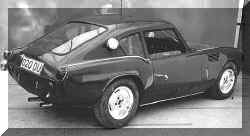
|
You have to remember that
these companies weren’t the multi-billion pound corporate machines that we now have
(to suffer). Triumph, though a fairly profitable company at the time, was not rich.
However they did find enough cash to start a new "Works" team. The new
team was spit into three sections. The Rough Road rally team, consisted of 2000 saloons (a
car I know nothing about, save it looked like the Mondeo of it’s era). |
Prototype Le
Mans Spitfire |
|
|
| The second group was the
Tarmac/Asphalt rally team, to be homologated Spitfires. These cars ran in such events as
the Tour de France and the Alpine Rally. The third was a group of very special prototype Spitfires, destined
for the Le Mans 24-hour race and Sebring, in Florida, USA. |
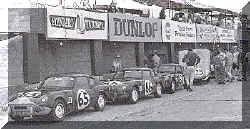
|
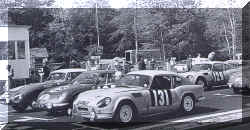
|
|
Sebring,
1965 |
| The start of another Tour De France
race with the Spitfire of Slotemaker and Hunter on the front row. A second Spitfire is on
the second row. The lead car, ADU 7B is today owned by Michael Moenstermann in Germany. |
The Glorious Few
| In 1964, 4
Spitfires were built, ADU 1B, ADU 2B, ADU 3B and ADU 4B. They
were all painted in Racing Green and had slightly different coloured flashes at the front.
Hurriedly prepared, they carried 1147cc engines, with a streamlined,
glassfibre hardtop (very similar to the eventual GT6). All four turned up for the ’64
Le Mans race, though only two were guaranteed a starting place. In the event, three cars
started, with ADU 4B left out of the action. Two cars crashed (ADU 1B and ADU 3B), but ADU
2B managed to come 3rd in it’s class, behind a couple of Alpine-Renaults,
reaching 21st place overall, beating the works Sprites by some margin. Later
that year, the cars entered the 12-hour race at Sebring in Florida. Two cars finished in 2nd
and 3rd places, ADU 1B crashing out. |
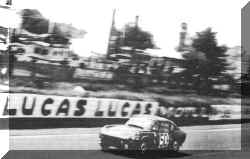
|
Le Mans, 1964 |
|
|
|
Their Finest Hour
| In 1965 the four
Spitfires returned to Le Mans with modified cylinder heads, engines developing 109 BHP, a
new streamlined bonnet (copied from Jaguars’ E-type design) and many lightweight
modifications. These amazing cars were capable of topping 140 MPH! All four cars started
and in the race, the Spitfires did themselves proud, taking a 1-2 in their category.
Although one car retired and one crashed, ADU 4B, the forgotten car of ’64 came good
and won it’s class, placing 13th overall with an average speed of over 95
MPH. |
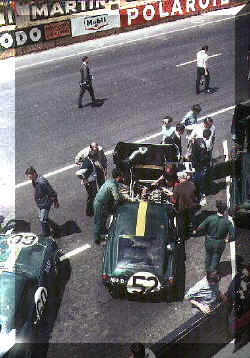
|
Below
left and below centre
- ADU 4B, the 1965 Le-Mans class-winning Spitfire, photographed in California, 1998. |
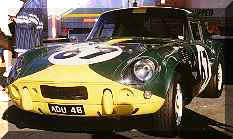 |
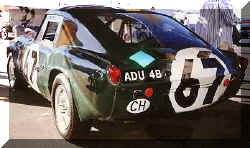 |
|
Above
- Le-Mans, 1965 |
Blue is the Colour
Meanwhile, a second string of Works cars were
being prepared for the Tour De France, Geneva and Alpine Rally’s. Four more cars, ADU
5B, ADU 6B, ADU 7B and ADU 8B (now believed
to be in Japan) were all prepared and painted powder blue. They all had GT6-style
fibreglass hardtops, with standard bonnets. In September 1964, ADU 7B won it’s class
in the Tour de France. In 1965, ADU 5B achieved a similar accolade in the ‘65 Paris
1,000km race. However the best was yet to come. In the 1965 Geneva Rally, a further car
was built with left hand drive. AVC 654B really shone by winning its class and the
category outright, beating even race-seasoned Porsche 904’s and Coopers, not to
mention Alpine-Renaults and MG’s into the ground. The only cars to beat the rallying
Spitfires was the Mini-Cooper S.
Forgotten Stars
ADU 467B was built along with the blue cars,
though was painted green and was ran buy Valerie Pirie and Stirling Moss’ Automobile
Racing Team.
ERW 412C was an effective 10th works
car that was built to race in the European Sports car events, winning many classes.
| During the late ‘60’s in
the USA, Bob Tullius took his Group 44
Spitfires and TR's to many SCCA Class victories, in particular a MK3 Spitfire driven by
Brian Furstenau. I have recently been in contact with one of Group 44's
former team members, and will be posting much more information on these
cars, in the near future. Mike Downs also won the 1969 SCCA class E
championship in the racing GT6+ (Mk2). SCCA still
holds categories in which Spitfires compete today. In fact, in 1996 Dean Johnson was
class G National Champion, in a Spitfire. Considering this class consists of Alfa Romeo's,
MG's and Porsches, this was no mean feat. |
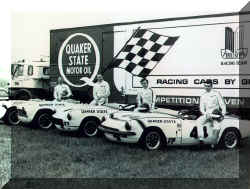
|
|
The Group 44
Racing Team |
| One of, if not the most spectacular
Spitfire was the so-called Macau Spitfire . Shipped to Hong Kong in 1965, to race
in the Far East, this car was effectively built from the spare parts of the works cars and
had an open top, with a perspex cowling around the driver, and a ‘hump’ behind
the drivers head, in the style of the Jaguar D-type racers. This car was amazingly lightweight
and though very successful in the Pacific, never raced in Europe. It then
travelled over to Kas Kastners racing team in the USA. |
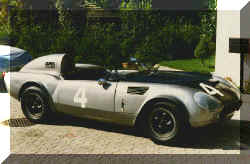 |
|
The
Macau Spitfire, Present Day |
Where Are They Now?
| ADU 1B |
|
Crashed heavily at Le
Mans in 1965 and retired, probably broken up for spares. Whereabouts
today unknown. |
| ADU 2B |
|
3rd in class at 1964
Le Mans. Crashed at Nurburgring in 1965/1966 and was rebuilt, probably
using spares from the other cars. Driven by privateer, Bill Bradley, it
won 14 out of 18 starts during 1966 season. Whereabouts today unknown. |
| ADU 3B |

|
Original crashed at
Le Mans in 1964. New car built in 1965 to take this identity. Finished
2nd in class at 1965 Le Mans 24. Today owned by Herve Lequippe in
France, where it is currently being restored. |
| ADU 4B |

|
1st in class at 1965
Le Mans, finishing 13th overall. Car still alive and well, as pictured
above. Recently the car was spotted for sale in a classic car magazine
with a price tag of $70,000! |
| ADU 5B |

|
1st in class 1964
Paris 1000k, Class win 1965 Geneva Rally. Currently being restored at UK
Triumph specialists John
Kipping. |
| ADU 6B |
|
2nd in class 1964
Geneva Rally, 2nd in Class 1965 Monte Carlo Rally. Whereabouts today
unknown. |
| ADU 7B |

|
Class win, 1964 Tour de
France, Class win (2nd overall), 1964 Geneva Rally. Owned and being
restored by Michael Moenstermann in Germany. |
| ADU 467B |
|
1964 Stirling Moss
Automobile Racing Team rally car, passed to Peter Cox in 1967. Currently
being restored at UK Triumph specialists John
Kipping. |
| AVC 654B |
|
Only Left-hand drive
factory competition car. 2nd in class 1965 Geneva Rally, Won 1965 Alpine
Rally prototype class - Currently privately owned in France. |
| Macau |

|
Having been
transported to the USA, where it was fitted with GT6 engine and TR6
gearbox, the original Macao car is alive and well and owned
by Dieter Messmer, of Switzerland and is being restored. |
| ERW 412C |
|
Loaned by Triumph to
Bill Bradley, who raced it in 1965-66. Whereabouts today unknown. |
| 412 VC |
|
Probably the oldest
and rarest of Spitfires. Originally the second prototype # X692, it was
built in 1962 and was entered as the first experimental racing Spitfire,
with Roy Fidler driving in several events. Whereabouts today unknown. |
A replica of the Macau car was also built by an official of
the TSSC and he took the car to compete in an historic re-run of the Macau GP. I no longer
have the details, but believe he was doing extremely well, until some kind of oil leak
ruined his chances, right at the end. Not to give up, he pushed the car over the finishing
line, placing.
Any information at all on any of the Racing Spitfires, is very welcome indeed, as I can’t seem to find much
information on them at all, although I must express great thanks to Michael,
Dieter and Herve for supplying me with their information.
There have been a lot of sightings of ex-works
cars - Alan Cook's Virtual
Racing site has some further information and reprints from Classic & Sportcar.
Makes a fine read.
 ADU4B,
Le-Mans Class-Winner, 1965
ADU4B,
Le-Mans Class-Winner, 1965
gazza@candw.ky
With thanks to Joe Curry, Author of the International Spitfire Database for
the ADU 4B Pictures, Tom Jell at The Triumph
Homepage and Amicale Spitfire,
the French Spitfire Club for several of the other pictures












